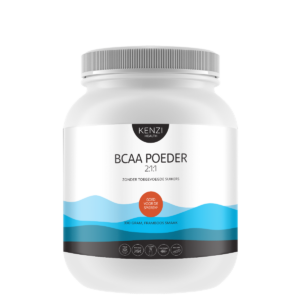BCAAs, or 'Branched-Chain Amino Acids', are a familiar concept to many athletes. These amino acids, which consist of leucine, isoleucine, and valine, play an important role in muscle recovery and building. But how exactly do they work? And are BCAA supplements really necessary for everyone who exercises? In this article, we’ll discuss the functions of BCAAs, where you can get them from, and when supplements can be useful.
What are BCAAs?
BCAAs are essential amino acids that have a unique branched structure. This structure makes them important for muscle protein synthesis and maintaining muscle mass. Your body cannot produce these amino acids on its own, so it is important to get them through food. BCAAs make up a large portion of the amino acids in your muscles, which explains their crucial role in muscle building and recovery explains. Leucine is the most well-known of the three, as it activates the mTOR pathway, a process necessary for turning on muscle protein synthesis. Isoleucine and valine support the process, but also have their own functions. For example, isoleucine helps regulate energy in the body, and valine plays an important role in maintaining mental sharpness during exercise.
What do BCAAs do for your body?
BCAAs are known for their ability to stimulate muscle growth and promote recovery. Not only do they play a key role in activating protein synthesis, but they also help to reduce muscle breakdown. This makes them popular among athletes who are looking to build muscle and recover after intense workouts.
BCAAs and muscle protein synthesis
Stimulating muscle protein synthesis is perhaps the most talked about function of BCAAs, with leucine being the key figure. Leucine activates the mechanism that creates new muscle cells, which speeds up the recovery process after exercise. A research by Drummond and Rasmussen turns out that leucine can directly stimulate protein synthesis, which is crucial for muscle growth and recovery. Read more about it here proteins.
Muscle Recovery and BCAAs
In addition to their role in building muscle mass, BCAAs can also accelerate muscle recovery. Several studies (Ra et al., 2017 and Weber et al., 2021) shows that the use of BCAA supplements can reduce muscle soreness after heavy workouts. This is because BCAAs help to repair damaged muscle tissue faster and prevent muscle breakdown during workouts.
How do you get BCAAs?
BCAAs are naturally found in a variety of protein-rich foods. Animal products such as meat, fish, eggs and dairy are rich in BCAAs. For people who eat a varied diet with sufficient protein, chances are you already get enough of these amino acids through food. Read more about how a vegan gets protein.
BCAAs in plant-based foods
Although animal products are richer in BCAAs, there are also plant sources of these amino acids. Think of nuts, seeds, lentils and legumes. For vegetarians and vegans it is important to vary in plant protein sources, because plant foods often do not have the same amino acid profile as animal products. For athletes following a vegetarian or vegan diet, it may be more difficult to get enough BCAAs. In that case, a supplement can be helpful to ensure that your muscles get enough nutrients to repair and build.
BCAA Deficiency: Is It a Risk?
BCAA deficiency is not common, especially if you eat a varied and protein-rich diet. For most people, BCAA deficiency will not lead to serious health problems. However, for athletes who do not get enough protein, a deficiency of these amino acids can result in muscle loss and reduced performance. For people who regularly train intensively, it is important to ensure that their protein intake is adequate to prevent muscle breakdown and promote recovery.
Do you need BCAA supplements?
Whether you need BCAA supplements depends on several factors, such as your diet and the intensity of your workouts. For athletes who have trouble getting enough protein from food, BCAA supplements can help BCAA supplements help them improve their performance and recover faster.
BCAAs for strength and endurance athletes
For strength athletes, BCAAs are especially useful for reducing muscle breakdown during intense workouts and for stimulating muscle growth. Studies (VanDusseldorp et al., 2018 and Salem et al., 2024) have shown that BCAA supplements can help speed recovery. Endurance athletes may also benefit from BCAAs, as these amino acids can serve as an alternative energy source during long workouts when glycogen stores are depleted. Read more about it here Creatine and Shilajit for athletes.
When is the best time to take BCAAs?
The timing of BCAA intake can be important for maximum effect. Many athletes choose to take BCAA supplements just before or after their workout. This is when your muscles will benefit most from an extra boost of amino acids for repair and growth.
Are there any side effects or risks?
BCAA supplements are generally considered safe. There are few reported side effects, although some people may experience gastrointestinal discomfort. It is important to pay attention to dosage and not take more than recommended.
How Much BCAA Do You Need?
There are no strict guidelines for the daily intake of BCAAs. Most supplements contain a few grams of BCAAs per dose, which contributes to your daily protein intake. According to the Health Council, an average adult needs about 0.8 grams of protein per kilogram of body weight per day, but for athletes this can be up to 2.0 grams per kilogram. For leucine, a safe upper limit of 5 grams per day is often used if you use supplements.
Conclusion: Are BCAA Supplements Worth It?
BCAAs are undoubtedly important for muscle recovery and building. For athletes who struggle to get enough protein from food, supplements can be a convenient and effective solution. However, for people who already eat a balanced, protein-rich diet, BCAA supplements may be unnecessary. It is important to consider your own diet and training needs before deciding to use supplements. If you are unsure whether you are getting enough BCAAs, it may be advisable to consult a specialist. BCAAs can be a valuable supplement for athletes looking to optimize performance and recovery, but they are not always necessary for everyone. Whether you need them depends on your personal goals, nutritional intake, and the intensity of your training.
***************************
*Any health claims made on the basis of plant ingredients are still being processed by the ESFA at the time of writing this blog.
In the context of European legislation on health claims, we are not allowed to mention on our website for which application you can use this supplement. Of course, we can provide you with personal advice. Please feel free to contact us by email at info@spiruella.nl or use our contact form! We are happy to help you!
****************************



Boost your health & energy with superfoods